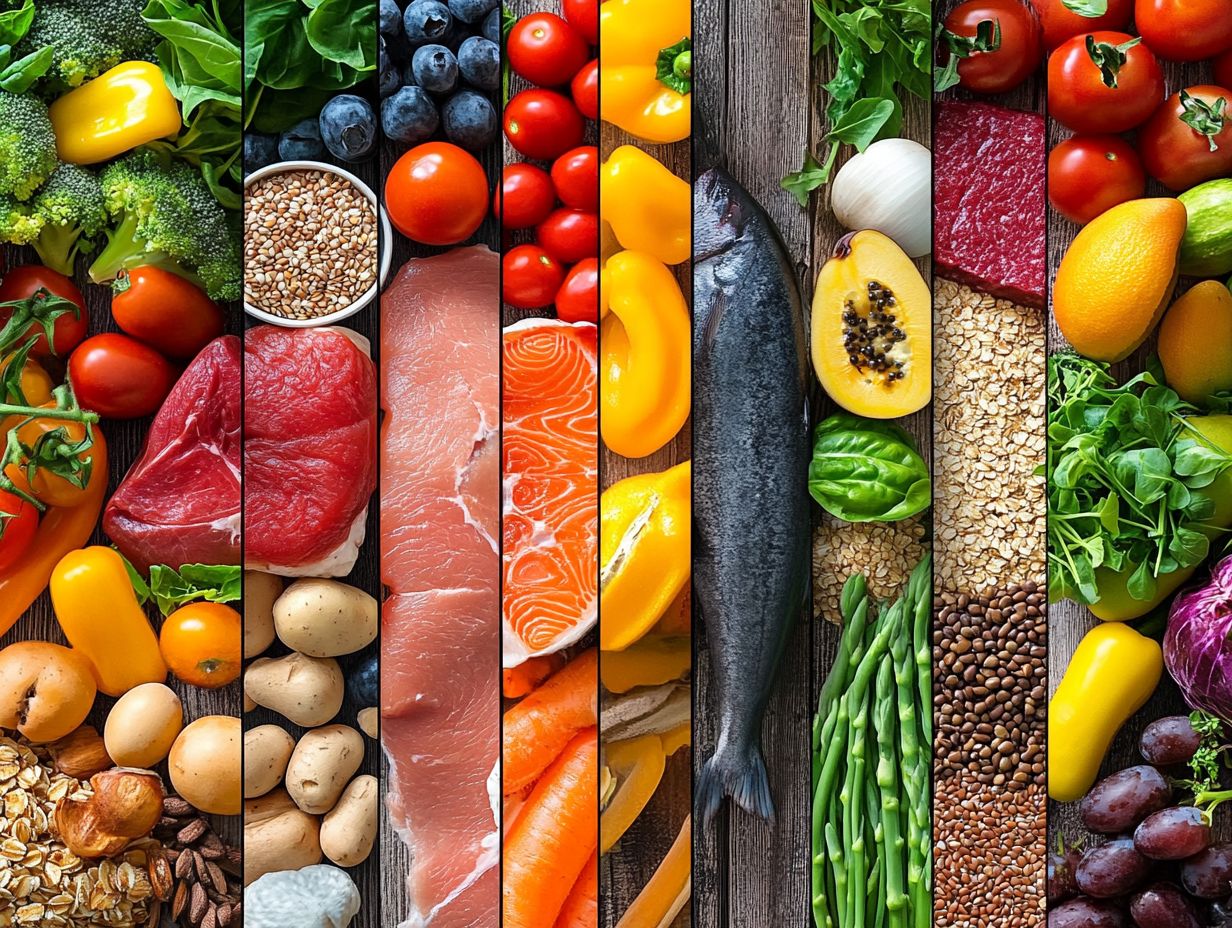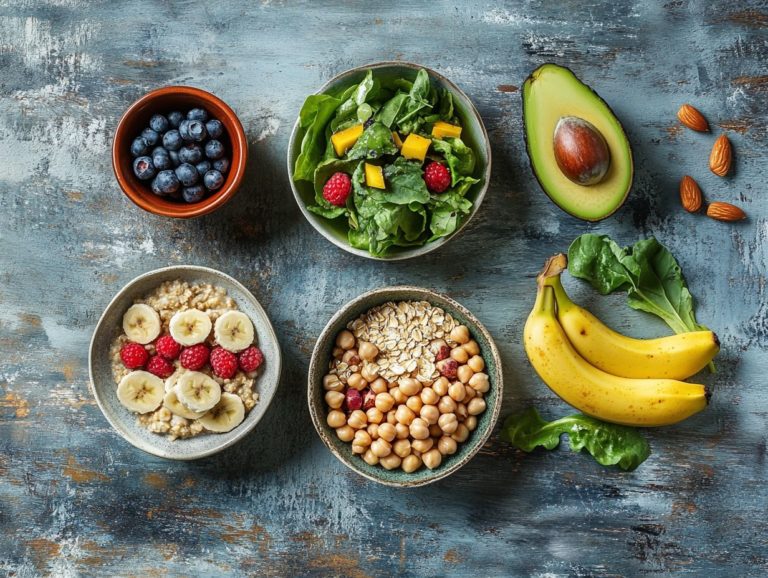The Benefits of Eating a Variety of Foods
Eating a diverse array of foods isn t merely a culinary adventure; it s crucial for your health.
A varied diet brings a wealth of nutritional benefits, bolstering everything from immune function to digestive well-being. This article delves into practical tips for diversifying your meals, examines the potential risks associated with a monotonous diet, and reveals how embracing food variety can assist in weight management.
It also underscores the unexpected psychological benefits that come with a vibrant plate.
Discover why variety genuinely matters in what you eat and how it can enrich your life.
Contents
- Key Takeaways:
- Why Variety is Important in Diet
- How to Incorporate Variety in Your Diet
- The Impact of a Monotonous Diet
- Eating a Variety of Foods for Weight Management
- The Psychological Benefits of a Varied Diet
- Frequently Asked Questions
- What are the benefits of including a variety of foods in your diet?
- How does a varied diet support weight management?
- What impact does a diverse diet have on your immune system?
- Can eating a variety of foods improve your mood?
- How does including a variety of foods benefit your digestive health?
- Are there any long-term benefits of having a varied diet?
Key Takeaways:

- A diverse diet provides essential nutrients for your health.
- Incorporating various foods can be simple and fun.
- A monotonous diet can lead to nutrient gaps.
- Variety helps manage weight and reduce cravings.
- Adding different foods can improve your mood and mental health.
Why Variety is Important in Diet
Embracing variety in your diet is essential for achieving optimal health. It ensures that you consume a broad spectrum of nutrients vital for maintaining overall wellness.
Experts like Beth Czerwony highlight that a diverse array of healthy foods, particularly fruits and vegetables, not only elevates flavor and enjoyment but also plays a crucial role in preventing chronic conditions like metabolic syndrome and heart disease.
Incorporating various food groups, including lean proteins, whole grains, and plant-based options, can significantly reduce your risk of obesity and other health issues.
Nutritional Benefits of Diverse Eating Habits
Diverse eating habits provide many nutritional benefits, highlighting the importance of variety in meal planning. They expose you to essential vitamins, minerals, and phytochemicals that boost your health.
By incorporating a variety of foods into your diet, you ensure an adequate intake of calcium, iron, and omega-3 fatty acids crucial elements for maintaining bone health, supporting red blood cell production, and promoting heart function.
Antioxidants found in fruits and vegetables, like vitamin C in citrus and beta-carotene in carrots, neutralize free radicals, helping reduce the risk of chronic diseases. Foods such as berries, nuts, and leafy greens are excellent sources of these protective compounds.
Colorful fruits and vegetables contain phytochemicals, which provide added health benefits and bolster your body s ability to combat inflammation. Emphasizing dietary diversity strengthens your immune system and supports long-term health.
This approach ensures you receive a broad spectrum of nutrients that cater to your body’s various needs and promote your overall well-being.
How to Incorporate Variety in Your Diet
Incorporating variety into your diet is more attainable than it seems. With some thoughtful planning, you can relish a diverse selection of foods that enhance your health and well-being.
Use strategies like intentional meal prep and crafting a detailed grocery list to help you select a range of items, including nutritious and plant-based foods, which are vital for achieving a balanced diet.
Practical Tips for Diversifying Meals

Ready to spice up your meals? Let s dive into some practical tips! Experiment with new recipes, incorporate seasonal fruits and vegetables, and employ various cooking methods. These simple changes can significantly enhance your dietary diversity.
Exploring different cuisines introduces you to exciting flavors and healthy foods that elevate your meals. For instance, try your hand at Mediterranean dishes that celebrate vibrant vegetables like eggplant and bell peppers.
Whip up a colorful stir-fry featuring seasonal produce like broccoli and snap peas. Don t hesitate to incorporate fruits into savory dishes; imagine a delightful mango salsa atop grilled fish or a zesty beet and citrus salad that adds a refreshing twist.
Utilizing a variety of cooking techniques roasting, steaming, or grilling can unlock unique tastes and textures. This ensures your meals remain intriguing!
Embrace global flavors by diving into Thai curries, Mexican enchiladas, or Indian dal. Each offers a rich tapestry of nutrients and satisfaction. The possibilities are endless, transforming meal planning into an enjoyable adventure.
The Impact of a Monotonous Diet
A monotonous diet can pave the way for a range of nutritional deficiencies and serious health repercussions, such as obesity, heart disease, and metabolic syndrome a group of conditions that increase the risk of heart disease and diabetes.
When you find yourself consuming the same foods repeatedly, you limit your intake of essential nutrients, creating imbalances that can detrimentally impact your overall health and well-being. It’s important to diversify your meals to nourish your body fully and maintain your vitality.
Potential Nutritional Deficiencies and Health Consequences
Potential nutritional deficiencies from a monotonous diet can lead to health issues, including impaired immune function and fatigue. Without essential nutrients like vitamin E, lean protein, and whole grains, your body may not function optimally.
These deficiencies can manifest as weakened immunity, leaving you more vulnerable to illnesses, and persistent tiredness that disrupts your daily routine. A lack of vitamin E typically found in nuts, seeds, and leafy greens can undermine cellular health.
Similarly, insufficient lean protein sources, such as chicken, fish, or legumes, might affect muscle repair and hormone production. Whole grains, including brown rice and quinoa, are vital for providing the fibers and B vitamins necessary for energy metabolism.
To enhance dietary diversity, consider integrating these foods into your meals. A vibrant salad featuring quinoa, grilled chicken, and a mix of nuts and seeds not only enriches your nutrient intake but also elevates the visual appeal of your dishes.
Eating a Variety of Foods for Weight Management
Start today! Eating a diverse range of foods is key to effective weight management. A varied diet not only supports weight loss but also plays a key role in maintaining a healthy weight over the long term.
By incorporating nutritious options from different food groups, you can more effectively manage your caloric intake and enhance the overall quality of your nutrition. This approach significantly reduces the risks associated with metabolic syndrome and obesity, giving you the power to lead a healthier life.
How a Diverse Diet Can Help with Weight Loss and Maintenance

A diverse diet can help with weight loss and maintenance. It offers a mix of flavors and textures, making meals enjoyable.
This variety encourages you to enjoy nutrient-rich foods essential for a healthy weight.
Incorporating fruits, vegetables, whole grains, and lean proteins enhances meal taste and supports feelings of fullness. This can help curb the urge to overindulge.
Having options keeps your motivation high and wards off meal fatigue. It makes it easier to stick to healthy eating habits.
Make the most of your diverse diet! Planning meals in advance can lead to vibrant dishes that are both nutritious and appealing.
Preparing vibrant salads, grain bowls, and stir-fries ensures that each plate looks appealing and is brimming with nutrients. Regularly experimenting with new recipes can spark creativity in your kitchen.
This fosters a positive relationship with food and promotes long-term success in managing your weight.
The Psychological Benefits of a Varied Diet
The psychological benefits of a varied diet extend beyond physical health. Enjoying a diverse range of foods can significantly enhance mental well-being.
A varied diet allows you to savor meals while discovering new flavors, ultimately fostering a positive relationship with food.
Improving Mood and Mental Well-being through Food Variety
Improving your mood and mental well-being through a diverse selection of foods is all about choosing healthy options that provide essential nutrients.
Enjoying a vibrant array of fruits, vegetables, and whole grains can elevate your mood and cultivate a positive mindset. Certain nutrients, like omega-3 fatty acids found in fish, walnuts, and flaxseeds, can help alleviate symptoms of anxiety and depression.
B-vitamins especially B6, B12, and folate are crucial for optimal brain function and neurotransmitter production that regulates mood. Exploring foods rich in these nutrients, such as leafy greens, legumes, and lean meats, can turn your culinary journey into an adventure.
By incorporating these ingredients into your daily meals and trying various recipes, you may notice improvements in emotional resilience and cognitive clarity.
Frequently Asked Questions
What are the benefits of including a variety of foods in your diet?

Eating a variety of foods ensures your body receives all necessary nutrients, vitamins, and minerals for optimal health, highlighting the importance of variety in your diet.
How does a varied diet support weight management?
Including a variety of foods in your meals can help maintain a healthy weight by providing a balanced intake of essential nutrients.
What impact does a diverse diet have on your immune system?
A varied diet can boost your immune system by providing a range of nutrients that support the body’s defenses against illnesses.
Can eating a variety of foods improve your mood?
Yes, a diverse diet has been linked to improved mood and mental well-being due to various nutrients that support brain function.
How does including a variety of foods benefit your digestive health?
Eating a diverse range of foods can improve digestive health by promoting a microbiome essential for breaking down food and absorbing nutrients.
Are there any long-term benefits of having a varied diet?
Yes, eating a wide variety of foods can reduce the risk of chronic diseases like heart disease, diabetes, and certain cancers due to the diverse nutrients and antioxidants they provide.
Start experimenting with your meals today and feel the difference!






